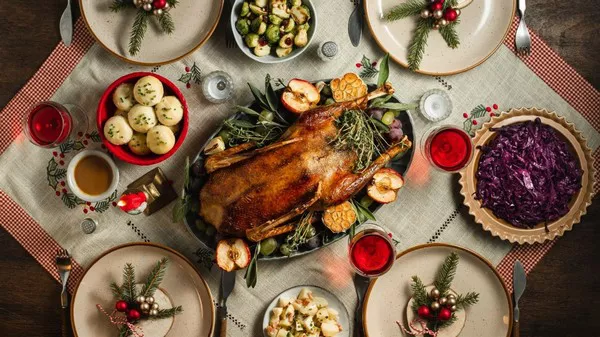Introduction to the Joy of Christmas Dinner
Christmas is a time for merriment, cherished traditions, and gathering loved ones around the dinner table. Planning a memorable Christmas dinner requires careful consideration and organization. This article serves as a comprehensive guide to help you navigate the process and create a festive and delicious holiday feast.
Setting the Tone: Deciding on the Ambiance
Before diving into the specifics of menu planning and preparation, it’s essential to establish the desired ambiance for your Christmas dinner. Consider factors such as the theme, decorations, lighting, and table settings that align with your personal style and reflect the spirit of the season. Whether you opt for a traditional, rustic, or modern approach, consistency in design elements will enhance the overall experience.
Making a Guest List and Extending Invitations
To ensure a successful Christmas dinner, start by making a guest list. Consider the size of your space, seating arrangements, and any dietary restrictions or preferences of your guests. Once the guest list is finalized, extend invitations well in advance, allowing ample time for RSVPs and adjustments to accommodate everyone comfortably.
Crafting a Memorable Menu
The centerpiece of any Christmas dinner is undoubtedly the menu. Take time to curate a well-balanced selection of dishes that cater to different tastes while incorporating traditional favorites. Begin by deciding whether you want a formal sit-down dinner or a more relaxed buffet-style meal. Consider appetizers, main courses, side dishes, desserts, and beverages that complement each other and create a harmonious dining experience.
Traditional vs. Innovative: Finding the Right Balance
When planning a Christmas dinner, strike a balance between honoring timeless traditions and infusing innovative elements into the menu. Classic dishes like roast turkey, glazed ham, or prime rib often take center stage, but don’t shy away from introducing new flavors or experimenting with unique recipes to surprise and delight your guests. Incorporate seasonal ingredients and festive flavors to add a touch of novelty without overshadowing the holiday spirit.
Catering to Dietary Restrictions and Preferences
In today’s diverse culinary landscape, it’s crucial to accommodate dietary restrictions and preferences when planning a Christmas dinner. Communicate with your guests in advance to gather information about any food allergies, intolerances, or specific dietary choices. Offer vegetarian, vegan, gluten-free, or other alternative options alongside traditional dishes to ensure everyone can indulge in the holiday feast.
Organizing the Cooking Schedule
To avoid last-minute chaos and stress, create a detailed cooking schedule well ahead of time. Identify which dishes can be prepared in advance and frozen, as well as those that require on-the-day preparation. Allocate specific time slots for tasks such as grocery shopping, prepping ingredients, cooking, and plating. A well-structured schedule will streamline the process, allowing you to enjoy the festivities alongside your guests.
Grocery Shopping and Ingredient Preparation
Prepare a comprehensive grocery list based on your finalized menu. Check your pantry for staples and non-perishable items, and note down any ingredients that need to be purchased closer to the date. Consider local farmers’ markets or specialty stores for fresh, high-quality produce and other unique ingredients. Prepare as much as possible in advance, such as chopping vegetables, marinating meats, or making sauces, to save time on the day of the event.
The Art of Table Setting and Decorations
Create an enchanting atmosphere by paying attention to table setting and decorations. Choose a color scheme that complements your overall theme and select elegant table linens, dinnerware, glassware, and cutlery. Enhance the table settings with carefully arranged centerpieces, candles, and small decorative accents. Personalized place cards can add a thoughtful touch, creating a sense of warmth and welcome for your guests.
Timing Is Everything: Coordinating the Meal
Timing is crucial when serving a multi-course Christmas dinner. Plan the sequence of dishes to ensure a smooth flow, allowing enough time between courses for socializing and enjoying each culinary creation. Keep track of cooking and baking times to ensure that all components are ready simultaneously. Consider utilizing timers or smartphone apps to help you stay organized and avoid any unnecessary delays.
Beverage Pairings and Festive Drinks
Pairing the right beverages with your Christmas dinner can elevate the dining experience. Offer a range of options, including wine, champagne, craft cocktails, non-alcoholic mocktails, and specialty hot beverages like mulled wine or spiced cider. Consider the flavor profiles of each dish and provide suggestions or tasting notes to guide your guests in selecting appropriate pairings.
Creating an Extraordinary Dessert Spread
No Christmas dinner would be complete without a sumptuous dessert spread. From traditional favorites like Christmas pudding, yule log, and fruitcake to innovative creations,

